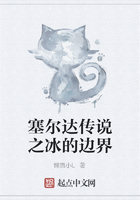gray with a pink border, revealed, by certain fuliginous stains, the unwholesome presence of smokers. Nothing ever more faithfully represented that prosaic precinct called by the newspapers an "editorial sanctum." Birotteau, fearing that he might be indiscreet, knocked sharply three times on the door opposite to that by which he entered.
"Come in!" cried Claparon, the reverberation of whose voice revealed the distance it had to traverse and the emptiness of the room,--in which Cesar heard the crackling of a good fire, though the owner was apparently not there.
The room was, in truth, Claparon's private office. Between the ostentatious reception-room of Francois Keller and the untidy abode of the counterfeit banker, there was all the difference that exists between Versailles and the wigwam of a Huron chief. Birotteau had witnessed the splendors of finance; he was now to see its fooleries.
Lying in bed, in a sort of oblong recess or den opening from the farther end of the office, and where the habits of a slovenly life had spoiled, dirtied, greased, torn, defaced, obliterated, and ruined furniture which had been elegant in its day, Claparon, at the entrance of Birotteau, wrapped his filthy dressing-gown around him, laid down his pipe, and drew together the curtains of the bed with a haste which made even the innocent perfumer suspect his morals.
"Sit down, monsieur," said the make-believe banker.
Claparon, without his wig, his head wrapped up in a bandanna handkerchief twisted awry, seemed all the more hideous to Birotteau because, when the dressing-gown gaped open, he saw an undershirt of knitted wool, once white, but now yellowed by wear indefinitely prolonged.
"Will you breakfast with me?" said Claparon, recollecting the perfumer's ball, and thinking to make him a return and also to put him off the scent by this invitation.
Cesar now perceived a round table, hastily cleared of its litter, which bore testimony to the presence of jovial company by a pate, oysters, white wine, and vulgar kidneys, /sautes au vin de champagne/, sodden in their own sauce. The light of a charcoal brazier gleamed on an /omelette aux truffes/.
Two covers and two napkins, soiled by the supper of the previous night, might have enlightened the purest innocence. Claparon, thinking himself very clever, pressed his invitation in spite of Cesar's refusal.
"I was to have had a guest, but that guest has disappointed me," said the crafty traveller, in a voice likely to reach a person buried under coverlets.
"Monsieur," said Birotteau, "I came solely on business, and I shall not detain you long."
"I'm used up," said Claparon, pointing to the desk and the tables piled with documents; "they don't leave me a poor miserable moment to myself! I don't receive people except on Saturdays. But as for you, my dear friend, I'll see you at any time. I haven't a moment to love or to loaf; I have lost even the inspiration of business; to catch its vim one must have the sloth of ease. Nobody ever sees me now on the boulevard doing nothing. Bah! I'm sick of business; I don't want to talk about business; I've got money enough, but I never can get enough happiness. My gracious! I want to travel,--to see Italy! Oh, that dear Italy! beautiful in spite of all her reverses! adorable land, where I
shall no doubt encounter some angel, complying yet majestic! I have always loved Italian women. Did you ever have an Italian woman yourself? No? Then come with me to Italy. We will see Venice, the abode of doges,--unfortunately fallen into those intelligent Austrian hands that know nothing of art! Bah! let us get rid of business, canals, loans, and peaceful governments. I'm a good fellow when I've got my pockets lined. Thunder! let's travel."
"One word, monsieur, and I will release you," said Birotteau. "You made over my notes to Monsieur Bidault."
"You mean Gigonnet, that good little Gigonnet, easy-going--"
"Yes," said Cesar; "but I wish,--and here I count upon your honor and delicacy,--"
Claparon bowed.
"--to renew those notes."
"Impossible!" snapped the banker. "I'm not alone in the matter. We have met in council,--regular Chamber; but we all agreed like bacon in a frying-pan. The devil! we deliberated. Those lands about the Madeleine don't amount to anything; we are operating elsewhere. Hey!
my dear sir, if we were not involved in the Champs Elysees and at the Bourse which they are going to finish, and in the quartier Saint-
Lazare and at Tivoli, we shouldn't be, as that fat Nucingen says, in /peaseness/ at all. What's the Madeleine to us?--a midge of a thing.
Pr-r-r! We don't play low, my good fellow," he said, tapping Birotteau on the stomach and catching him round the waist. "Come, let's have our breakfast, and talk," added Claparon, wishing to soften his refusal.
"Very good," said Birotteau. "So much the worse for the other guest,"
he thought, meaning to make Claparon drunk, and to find out who were his real associates in an affair which began to look suspicious to him.
"All right! Victoire!" called the banker.
This call brought a regular Leonarde, tricked out like a fish-woman.
"Tell the clerks that I can't see any one,--not even Nucingen, Keller, Gigonnet, and all the rest of them."
"No one has come but Monsieur Lempereur."
"He can receive the great people," said Claparon; "the small fry are not to get beyond the first room. They are to say I'm cogitating a great enterprise--in champagne."
To make an old commercial traveller drunk is an impossibility. Cesar mistook the elation of the man's vulgarity when he attempted to sound his mind.
"That infamous Roguin is still connected with you," he began; "don't you think you ought to write and tell him to assist an old friend whom he has compromised,--a man with whom he dined every Sunday, and whom he has known for twenty years?"
"Roguin? A fool! his share is ours now. Don't be worried, old fellow, all will go well. Pay up to the 15th, and after that we will see--I














